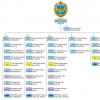The current state of the English language. Modern English What dialects exist in English
Modern English has existed since the 15th century. With the development of printing and the distribution of books, the normative book language is being consolidated; phonetics and vernacular continue to change, moving away from dictionary norms.
English ((the) English (language)) is the language of the British (the official language of Great Britain), residents of the USA, Australia, New Zealand and one of the 2 official languages of Ireland, Canada and Malta. It is used as official in some countries of Asia (India, Pakistan, etc.) and Africa. Linguistically speaking, English speakers are called Anglophones, especially in Canada.
English belongs to the Germanic languages of the Indo-European language family. The number of speakers of it as a native language is about 410 million, speakers (including a second language) are about 1 billion people. It is one of the 6 official and working languages of the UN. Grammatically, it belongs to the analytical type of languages.
Phonetics
In addition to some modern dialects and dialects of the USA and England, it stands out
- lack of soft consonants
- no muting of final consonants (as in head)
- rare assimilation and dissimilation.
Vocabulary
About 70% of English vocabulary is borrowed, so it is a mixed language. During the Renaissance, with its flourishing trade, Latin, Italian, Spanish, Dutch, Arabic and other borrowings poured into English speech. In connection with English colonization came the native words: jungle (jungle) from Sanskrit, canoe (canoe) from Indian, taboo (taboo) from Polynesian, etc.
English has a huge vocabulary - about half a million words. The vocabulary is 30% Germanic in origin, 55% Latin-French and 15% Ancient Greek, Italian, Spanish, Portuguese, Dutch and German.
Written speech has 85% of Germanic words to the total number of words of the text. In the documentation, the share of German words is reduced to 75-80%. These are mainly articles, auxiliary verbs and postpositions.
Spelling
English writing based on the Latin alphabet has existed since the 7th century. Traditional spellings predominate in spelling. English spelling is considered the most difficult to learn among Indo-European ones. While it reflects the speech of the Renaissance period, it does not correspond to the modern speech of Anglophones. Many words are written with letters that are not pronounced when reading, and, conversely, many sounds do not have spellings. The reading rules are limited by so many exceptions that they become meaningless. The student has to learn the spelling or pronunciation of each new word, and therefore its transcription is indicated in dictionaries.
Punctuation
English punctuation is quite simple, sometimes differing between British and American. So, Americans write appeals Mr, Mrs and Dr with a dot, quotation marks with a double apostrophe » « , and the British - single ‘ ’ .
Differences from Russian
- Orthophonological discrepancy
There is no consistent relationship between orthography and phonology. Without knowledge of traditional pronunciation, it is not always possible to correctly read a word from a sheet.
- Semi-absence of gender
- Avoiding double negatives
Except for common speech (slang).
- Wide collocation
English Joke
The farmer decided to give special attention to the development of his poultry yard, and he undertook the work carefully and systematically. His hired man, who had been with him for a number of years, was instructed, among other things, to write on each egg the date laid and the breed of the hen. After a month, the hired man left.
“I can’t understand,” the farmer declared, surprised and pained, “why you should want to leave.”
“I’m through,” the hired man asserted. “I’ve done the nastiest jobs, an’ never kicked. But I draw the line on bein’ secretary to a bunch o’ hens.”
As mentioned above, three languages coexisted in England after the Norman Conquest: English, French (Anglo-Norman) and Latin. The English dialects spoken by the indigenous population were equal to each other; Various works were written in them, but English was not used as the official language. The official state language used in legal proceedings, parliamentary debates and education was Anglo-Norman. Latin was the language of the church and science.
With the increasing assimilation of the Norman part of the population, English penetrated into those social strata where French had previously been the language of communication. Since the 13th century. One can trace the gradual expansion of the use of English. Thus, French began to lose ground. Thus, in 1258, the English king Henry III addressed the inhabitants of the country with an appeal in two languages - French and English (London dialect). In the middle of the 14th century. The rise of the English language becomes even more evident. English began to gradually displace French from legal proceedings and parliament; Teaching in schools begins to be conducted in English.
By the end of the 14th century. English finally becomes the official language. The last act that finally cemented the victory of the English language over French was the abolition of French as the language of school instruction in 1477. Since that time, there has been a change in the relationship between the dialects. The London dialect acquires a special position, incorporating features of various dialects. However, its basis is east-central with an admixture of southwestern elements, as well as other dialects.
London dialect of the early 14th century. represented by the poems of Adami Devi; the second half - works by Geoffrey Chaucer, John Gower and John Wycliffe. It should be noted the enormous role of the works of J. Chaucer (1340-1400) in the development of English literature. His largest works, “Canterbury Tales” and “A Legend of Good Women,” were copied in many copies and distributed throughout the country, which undoubtedly contributed to the spread of the written form of the London dialect. An equally important role was played by the translation of the Bible into English made by J. Wycliffe.
During the 15th century. The London literary language gradually spread, displacing local dialects. Being the capital of the state, London was a major trading center, a city of powerful guild organizations; people of various professions from various regions, speaking different dialects, arrived there. Thus, at the early stage of the formation of the national language, various dialect forms, both pronunciation and grammatical, coexisted in the London dialect. The concept of a language norm did not yet exist; there was a tradition that could not eliminate multivariance.
It should be noted. That the 15th century was a period of major changes in the government structure of England. After the War of the Scarlet and White Roses (1455 - 1485), the absolute monarchy of the Tudor dynasty was established in the country. This contributed to a sharp centralization of power and the separation of the state language from dialects, which became oral dialects.
The London dialect, as the dialect of the largest economic, administrative and political center of the country, had a huge influence on the language of all regions of the country. The introduction of printing played a major role in this. The pioneer English printer was William Caxton, a native of Kent who became acquainted with printing in the city of Bruges in Flanders. Here, in 1475, Caxton published his first book in English, “The Recuyell of the Histories of Troy.” Returning to his homeland, Caxton opened a printing house in London, and in 1477 the first printed book, “The Dictes and Sayings of the Philosophers,” appeared in England.
Since the concept of a norm did not yet exist, Caxton was not sure of the correctness of his language. With regard to spelling, he adhered to the tradition developed by the scribes. However, this spelling tradition was already outdated, because did not eliminate the discrepancies that appeared between spelling and pronunciation. By using this outdated spelling in printed publications, Caxton thereby consolidated it.
Thus, by the 16th century. the special position of the London dialect as the basis of the emerging national language was clearly outlined, and by the end of the 16th century. the formation of the national language can be considered complete. It went simultaneously with the formation of the English nation. If the language of a nationality is represented only in territorial dialects, the national language is supra-territorial, because serves the entire country. Dialects become practically unwritten, and the national language dominates in the sphere of written use. In the sphere of oral communication, the national language functions in all government institutions.
Social changes in England in the 16th century. created the preconditions for a great social and cultural upsurge, on the basis of which a new national literature arose. After the barren 15th century, which did not create a single significant literary monument, in the 16th century. A large number of major literary works are being created. A whole galaxy of playwrights appears - William Shakespeare, Christopher Marlowe, Benjamin Johnson, John Fletcher, Francis Beaumont. This era, which is usually called Elizabethan (Elizabeth I - 1558-1603), is linguistically included in the period of the Early Modern English language.
The teaching of the native language in school begins in the late 16th and early 17th centuries. In this regard, there is a need to develop universal language norms. This problem is solved like this. called grammarians and spellers. Among the most famous spelling artists of the 16th century. Hart, W. Bullocar should be included; 17th century – A. Gill; Ch. Butler, Ch. Cooper; 18th century – J. Jones; 19th century – J. Walker. Orthoepists are to a certain extent the predecessors of phoneticians at the pre-scientific level. They tried to describe their contemporary pronunciation in terms of the relationship between letters and sounds and give certain recommendations. The starting point in this case was the letter, and spellers did not always distinguish between letters and sounds.
The first grammars of the English language were modeled on Latin ones; in particular, the first grammarians focused on Latin grammar. Among them are the names of W. Bullocar, B. Johnson, C. Johnson, C. Butler, J. Wallis, etc. During this period, one should distinguish between grammarians adhering to the tradition and authors with more advanced views. In the grammar of the 17th - early 18th centuries. There are two main directions: rationalistic and empirical. Thus, some grammarians believed that language should come from the mind (“reason”), i.e. logicians, others, on the contrary, believed that when establishing rules one should proceed from existing custom (“usage”), i.e. from established usage in the language. However, in reality, both these directions were not so far apart. The principles of “reason” and “custom” were used only to resolve controversial issues when choosing one of the options existing in the language.
In the second half of the 18th century. grammarians set themselves the goal of “improving” the language, clearing it of all unnecessary things, and fixing it in this form forever. In accordance with their goal, grammarians of this time not only described the language, but also established certain rules, recommendations and prohibitions.
Among the rationalist scientists we can name R. Lowth, a representative of the principle of “correctness” based on logic (“reason”), J. Edison, J. Swift.
In contrast to the rationalists, who did not recognize any changes in language and considered them as corruption, representatives of the empirical school recognized change and development in language. So, for example, J. Priestley advocates following established usage (“usage”). But he also recognizes in controversial cases the need to apply the criterion of “consistency with reason.” Proponents of this trend include such grammatical authors as Brightland and Greenwood. Thus, by the end of the 18th century. rules for the use of grammatical forms were established.
Simultaneously with spellers and grammarians, lexicographers also made their contribution to the scientific study of language, striving to record the vocabulary of the language. The first dictionaries were bilingual Latin-English dictionaries. Then dictionaries of difficult words and explanatory dictionaries appear (for example, N. Bailey’s dictionary “A Universal Etimological English Dictionary”). In 1755, Dr. Samuel Johnson's Great Oxford Dictionary was published. This dictionary enjoyed great popularity and authority. It was a universal reference book for writers of the 19th century, because was compiled from original sources. In his dictionary, Johnson strives to preserve traditional spelling; in pronunciation, he recommends deviating as little as possible from the spelling.
During the 17th – 18th centuries. The English language has developed a stable literary norm, which took shape and was consolidated in the works of grammarians and spellers, as well as in numerous literary works of this period. Literary language of the 18th century. differs by a much greater degree of standardization and regulation than the Early Modern English language of the 16th - 17th centuries.
Thus, by the end of the 18th - beginning of the 19th centuries. the norm of the national literary language was completely established. That educational and reference apparatus was created - grammars and dictionaries - which allows the speaker (and writer) in a given language to choose the correct form or the corresponding word within the limits of this norm.
At the present stage of language development, two main varieties of English can be distinguished - British English and American English. According to the Russian linguist A.I. Domashnev, these variants are certain forms of adaptation of a single language to the conditions, needs of social development and traditions of nations that are native speakers of a given language and represent special forms of functioning of a single language (Domashnev, 1990).
The modern British language is far from classical English, which existed more than 300 years ago. British English is divided into three language types (Koptelova, 2000). The first type is conservative English, which reflects the English of the past and which has not been developed under the influence of modernity (conservative - the language of the royal family and parliament). Conservative English is used extremely rarely even in the most civilized part of Great Britain. It is spoken by no more than 5% of the country's total population.
The second reflects the standard language of the business world. In this type, all norms and rules of the language are strictly observed (received pronunciation, RP - the language of the media, it is also called BBC English). The language of the educated population of London and the south-east of England eventually acquired the status of a national standard (RP). It is based on “correct English” - the language of the best private schools and universities. This is that classical, literary English, which is the basis of any English course in linguistic schools for foreigners.
The third type is spoken English or advanced English (advanced - the language of youth). This type is the most mobile; it is he who constantly absorbs elements of other languages and cultures. Advanced English is most susceptible to the general trend towards simplifying the language.
Unlike the British version, American English is more flexible. This is the language of a new generation that unites people, thanks mainly to a common culture, rock music, films, close communication, as well as the ideals and idols that society lives by.
At the end of the 20th century, the development and spread of the American version caused accusations of neo-colonialism and suppression of other languages among English-speaking states, which in turn caused the development of the anti-globalization movement. The governments of many Western countries tried in every possible way to consolidate the status of their country's language as the state language. So, in 1994 In France, the Toubon Law was adopted, providing for considerable fines for the abuse of foreign words in the media. Similar measures were taken in Israel and Poland. In Germany, the Society for the Protection of the German Language was created by philologists, university teachers, and cultural figures (Bovarskaya, 2005).
It should be noted, however, that in most countries of the world the spread of the English language occurs voluntarily, and is not imposed by force from the outside. In Germany, for example, the Society for the Defense of the German Language is against using the struggle for the purity of the language for nationalist purposes. It is critical, but not hostile, to everything American (Bovarskaya, 2004). And in China, the demand for learning English is so great that the number of students studying English exceeds the number of people in the United States.
English is becoming an international language at incredible speed. The Germans are already talking about ein Image Problem and das Cashflow, the Italians are programming their computers with il software, the French are going to weekend break, the Spaniards are flirting, the Austrians are eating Big Macs, the Japanese are going to pikunikku, and in Russia they are already accustomed to the words show, supermarket, office and even a loser and a killer. Over the past 15 years, according to experts, we have already used about 10 thousand. foreign words, mainly from American English (Bovarskaya, 2005).
Unlike other languages, English demonstrates certain grammatical advantages: the absence of gender for nouns and declensions for pronouns. So, for example, if you want to say the word you in German, you must choose from 7 words: du, dich, dir, Sie, Ihnen, ihr and euch.
The English language tends to be clear and concise: for example, the English phrase a business trust company in German sounds like Wirtschaftstreuhandgesellschaft, and in Holland similar company names have more than 40 letters (Bovarskaya, 2004).
But these linguistic features are not enough to distinguish English as a global language. These advantages of the language must necessarily be correlated with the cultural, economic, political and military power of the country. Only then can it become a means of international communication. “A language becomes international for one overriding reason,” wrote the famous linguist David Crystal, “the political power of the people who speak the language, especially military power” (Bovarskaya, 2004).
According to the director of the Russian representative office of the British school Language Link, Robert Jensky, we can now talk about the emergence and consolidation of a kind of averaged universal English, which has absorbed the features of both variants. This one is not American or British or anything else. This is the language of international communication (Koptelova, 2000).
Greetings to all! You have definitely decided to study English. Now all that remains is to decide which variant and dialect. There is an opinion that it is the British varieties of English that are universal. However, I beg to differ with this statement. If you are going to live, work or work in the US, why would you want to master the UK version and then re-learn? It is better to start immediately with the version that you will need.
In addition, even within the framework of the British, there are several dialects. And the same can be said about American English, as well as Australian, Canadian and others. So what variants and dialects of the English language exist, and how and which one, in the end, should be taught. This is what our article is about today.
The history of English variants
First, a little history about the origin of varieties of English. Several centuries ago there was only one version of English spoken in Britain. Other varieties of the English language began to appear then, the British began to actively conquer new lands on all continents.
Thus, interacting with the local dialects and dialects spoken by the inhabitants of the new British colonies, the following variants of modern English appeared:
- British
- American
- Indian
- Australian
- Irish
- Canadian
- African
- New Zealand
Of course, in each of the colonies, English developed along its own path, evolving and enriching itself.  The result is completely different dialects and varieties of modern English.
The result is completely different dialects and varieties of modern English.
The New Zealand, Australian and Irish variants are closest to the same classic British English that existed 300-400 years ago. This is explained by the fact that these states and territories, due to their geographical location and isolation, were not strongly influenced by the cultures and languages of other countries.
What are the differences between English variants?
This question is of primary interest to those starting to study the varieties of modern English. The main differences are in phonetics, that is, in the difference in pronunciation, melody, melodiousness or, conversely, rhythm.
In particular, the Irish version of modern English has a more “neutral”, smooth pronunciation, and there is a simplification and replacement of complex phonemes. The Irish also add neutral sounds to the articulation of words. So, the word “film” in Ireland will sound like “filem”. This melodiousness is the result of the influence of the Celtic language.
Australian version with an even slower beat. It is characterized by a more even scale of intonation fluctuations. So, an Englishman will pronounce the word “day” as “day”, and an Australian will say “di”. By the way, the well-known lexeme “love” among the British is “lav”, among the Scots we will hear “luv”, and among the Irish we will hear “liv”.
North America formed a completely different language, changing not only the sound, but also the spelling. “Shop” for Americans will sound “shap”, and for the British “shop”. The changes affected vocabulary, phonetics, and stable grammar. Therefore, it is quite natural that the main disputes and disagreements concern precisely two versions of English - American and British. 
 Differences between dialects American English, unlike modern British English, is easier to understand and more open and flexible to change and correction. That is why the American version has gained the greatest popularity and distribution in the world. It has become the language of the new generation of any place of residence and any nationality, which grew up and is brought up on popular culture.
Differences between dialects American English, unlike modern British English, is easier to understand and more open and flexible to change and correction. That is why the American version has gained the greatest popularity and distribution in the world. It has become the language of the new generation of any place of residence and any nationality, which grew up and is brought up on popular culture.
American English
Modern American English is known as "simplified language". This definition fully reflects the essence of this version. Ordinary people from different countries of the world who went to America in search of wealth needed a universal language of communication. The pure British language of the English aristocrats was not suitable for mastery by the common people.
Therefore, the modern American version is based on the spoken language of the British bourgeoisie and merchants. However, at that time, not only the Irish, Scots and British explored the lands of North America. Other European peoples also went there in search of happiness: Italians, Spaniards, Germans, French, Scandinavians and Slavs.
The newly formed nation needed a unifying means of communication so that everyone’s national languages did not become a stumbling block. This means was the transformed English language, which should be simpler in pronunciation, writing, and grammar, and at the same time contain elements of other languages. As a result, the well-known version of modern American English was formed.
Modern innovative technologies, global business, and a developed entertainment industry—all of this originates in the United States and flourishes all over the world. The entire culture and history of America, the mentality of Americans fit into the phrase “American Dream”, to which a huge number of people from all continents strive. The fact that the entire world community is studying English is also a merit not of the British, but of the Americans.
Universal English
The English that all foreigners study in language schools today is dubbed by native speakers as the “language of textbooks” - “Course Book English”. It is a universal standard language that is common and basic to all varieties of English. The “language of textbooks” is devoid of color and flavor - those elements that serve as a distinctive feature of the speech of a native speaker and a foreigner.
Each version of modern English has its own jargon, phraseological units, metaphors, stable idioms and even profanity. To know them, as well as the local melody and pronunciation, means to approach perfect command of the language as if it were your own. But this task is incomprehensible to most. But few people set such a goal for themselves?! 
 British versus American Today, English is one of the means of communication, not only with native speakers, but also with people of other nationalities, as well as for Internet communication. Universal English is not British, not American, not Australian, or any other variant - it is precisely the language of international communication. And this language is as simplified as possible for learning and understanding.
British versus American Today, English is one of the means of communication, not only with native speakers, but also with people of other nationalities, as well as for Internet communication. Universal English is not British, not American, not Australian, or any other variant - it is precisely the language of international communication. And this language is as simplified as possible for learning and understanding.
“International Business English” operates with the same concepts. Another established myth is that this is the American version. Despite the fact that business is an American invention, and the best business schools are located in the USA, business English cannot be attributed to any of the options. This is a universal professional language, neutral in color. It contains a limited set of terms and highly specialized cliches.
The language of business is studied while mastering a profession. It can even be studied at specialized trainings and courses - Business English. The basic information contained in the programs of these courses is approximately the same in all schools. Therefore, there is no significant difference where to study: in Australia, Great Britain, Canada, the USA or Russia.
What dialects are there in English?
Let's look at the dialects of the English language within the framework of the two most common variants - British and American.
In the British version the following dialects are distinguished:
- Received Pronunciation(accepted standard) or - BBC English- a language that is considered standard by national media and educated speakers
- Conservative English(conservative) - aristocratic English, which is used by parliament and members of the royal family
- Advanced English(advanced, youth) - the most simplified, malleable and actively changing language, incorporating other national dialects
The language of young people is most susceptible to changes, especially in vocabulary. The world around us is changing, new processes are emerging that need to be given names, and old ones need to be given new names. This is how new dialects appear. Also, the British vocabulary is replenished by borrowings from other varieties of English, mostly from American. 
 Dialects of the New England period In the United Kingdom itself, the following dialects can be distinguished: Scottish, Northern, Irish, Central, South-Eastern, Welsh and South-Eastern. The latter, by the way, has acquired national status, since it is based on “correct English”. This dialect is used in the best private schools and universities in the UK such as Rugby, Eton, Harrow, Winchester, Cambridge, Oxford.
Dialects of the New England period In the United Kingdom itself, the following dialects can be distinguished: Scottish, Northern, Irish, Central, South-Eastern, Welsh and South-Eastern. The latter, by the way, has acquired national status, since it is based on “correct English”. This dialect is used in the best private schools and universities in the UK such as Rugby, Eton, Harrow, Winchester, Cambridge, Oxford.
The same literary, classical dialect of the British version is taught in our secondary schools, colleges and universities in Foreign Language. It is the basis for any English courses in every linguistic school where foreigners are taught the language.
As for American variability, the following main dialects clearly differ:
- Northern
- Central
- Southern (California)
However, each of these dialects is further subdivided into several subdialects. And if the North American dialect is very close in phonetics to classical British, since the first settlers from Britain settled here, then the southern or Californian dialect is considered the classic American dialect.
It is the most rich and characteristic of American pronunciation. Here the “rattling” is more emphasized, the vowels are shortened, and the consonants are more sonorous. Thus, the word “Better” in the southern dialect turns from the universally accepted “bete” into “bader”.
Which variant or dialect should I learn?
The answer to this question, in fact, lies on the surface. It all depends on the goal: why you need knowledge of English. If you need it for general development, then the American version of the southern dialect or the British version of the youth dialect is suitable; you need this same version if you intend to migrate to the USA, and you have to take the TOEFL exam and other international tests.
Are you planning to work or study in Canada? Then check out the Canadian version. Thinking of migrating to the UK? Then study the British version of the accepted standard or advanced dialect. When going to Australia, focus on the features of the Australian variation, etc. The only recommendation is to learn “correct English”, which is taught in schools, universities and academies. 
 US dialect Many Russian linguists and teachers advise studying the British version of the “Received Pronunciation” dialect, since this version is considered to be “correct basic English.” Moreover, it is this variation that is taught in our country. Knowledge of basic English will make it easier to understand and master all other variants, dialects and modifications of this language.
US dialect Many Russian linguists and teachers advise studying the British version of the “Received Pronunciation” dialect, since this version is considered to be “correct basic English.” Moreover, it is this variation that is taught in our country. Knowledge of basic English will make it easier to understand and master all other variants, dialects and modifications of this language.
According to our teachers, it is also necessary to study British because it is the richest and most complete version, which lies at the origins of all the others. American phonetics and grammar, unlike British ones, are much simpler. Thus, speakers from the USA use only simple tenses (Simple) and practically do not use perfect forms. Pronunciation has also been simplified.
The American language is called “sloppy”, while the British language is cleaner and more scrupulous. It has more intonation varieties, which form a variety of tones: sliding and stepped, ascending and descending, they have a rich intonation scale. In America, there is only one intonation scale and one falling tone, which form the sound structure of their language.
Thus, what will give you away as a foreigner’s accent is not the pronunciation of the sound itself, but the tempo and tonality. If you tighten or tighten the sound a little, the speakers will immediately see through you. By the way, the residents of the USA themselves are, as they say, “dragged” by the British, they are literally in awe of their pronunciation. Americans try to imitate the British, and sometimes invite them to visit, ask them to tell interesting stories, and they themselves enthusiastically enjoy the sound of pronunciation.
They also call the British a refined language, cleared of all speech errors, which the Americans never had, because their language was originally the result of mixing. When Americans envy “English culture, language and traditions,” they say “show off,” that is, “show off.” But what the British answer to them is that they are simply “polite” and “brought” - “polite” and “well-mannered”.
How to quickly learn another option?
Naturally, Russian linguists give preference to a more correct and pure language. After all, our educational institutions initially focus on modern classical English. However, professional teachers should still explain and show the difference between the British and American versions, but only when the student reaches an advanced level.
Whereas at the initial stage, it will be enough for the student to learn to understand at least one variant or dialect well. After all, even in order to learn one of the versions of a foreign language, you will have to put in a lot of patience, perseverance, time and effort. “Fast” techniques and intensive communication methods are unlikely to help here. They are suitable for developing communication skills and
Loginova Valentina
Download:
Preview:
Municipal educational institution
basic secondary school No. 1
Karasuksky district, Novosibirsk region.
Variants of modern English.
Loginova Valentina Sergeevna
8th grade student
Tsygankova Natalya Ivanovna
Plan.
- Variants of modern English:
A) British
B) American
- The nature of lexical features of American English.
Sources for the emergence of new vocabulary:
A) Borrowings from other languages.
B) Various types of innovation.
- Categories for comparison of American and British language options:
A) General words.
B) General concepts - different words.
C) Words without analogues.
- The main differences between the American and British versions:
A) Spelling
B) Phonetics
C) Grammar
- Conclusion.
English in the modern world.
Not a single language ever invented by man has become a universal world language. The United Nations, based on the actual distribution of languages in the world community, has chosen the following six languages as its official or working languages: English, French, Spanish, Russian, Arabic and Chinese. A special place among them currently belongs to the English language.
English is the native language of more than 400 million people living in 12 countries, including: USA, UK, Canada, Australia, New Zealand. It also ranks first in the world among foreign languages studied in secondary and higher schools, in clubs and courses in the adult education system. In France, for example, 85% of secondary school students take a compulsory four-year course in English. In Russia, about 70% of students in secondary and higher educational institutions study English.
In the modern world, English plays an extremely important role in such areas of human activity as science, technology, economics, trade, diplomacy, and tourism. This language is the international language of aviation and shipping. 80% of all information stored in the world's computers is presented in English.
It acts as the working language of the vast majority of international scientific, technical, political and professional international congresses, conferences, symposia and seminars. Those. English today plays the same role that Latin played in Europe in the Middle Ages.
Thus, while studying the role of the English language in the modern world, my attention was drawn to the fact that there are several varieties of modern English, but among them two occupy a special position: British and American.
The American and British versions are not different languages, and this is confirmed by the practice of my research.
But the final result that I would like to achieve when completing the work is to identify the differences between the two versions of the language and the general patterns of their development.
I realize that it is impossible to describe and find All subtleties in the differences and similarities of these options, but as Walt Disney said, “It is fun to do the impossible.”
What is the novelty of this work?
To achieve the results of my research, I used methods of empirical knowledge for the first time in relation to this material.
Before starting this work, the teacher introduced me to several research methods, but we settled on the use of the general method of scientific knowledge - empirical, which is a comparison and is one of the most common. We know that everything is learned by comparison. As for language variants, here, in my opinion, only through comparison can the real truth be established in their similarities and differences.
The influence of the British version is due to the fact that it is traditionally used as a subject of study in the education system of most countries of the world. The increasing role of the American version is explained by the place occupied by the United States of America in modern economic, scientific and cultural life and, above all, by the activities of the media (cinema, television, video, print). The American and British versions are not different languages, and this is confirmed by practice: Americans, Canadians, English, Australians and New Zealanders communicate without difficulty with each other. However, believing that these variants of the English language have much more in common than what is different, we should not forget that such an assessment is of a qualitative nature. Naturally, there are quite a lot of specific differences, and they are especially noticeable in vocabulary. A few words about the nature of the lexical features of American English.
This option has a four-century history. In the 17th century, the first settlers from England arrived on the Atlantic coast of the American continent, speaking different dialects. In the earliest “colonial” period, settlers began to need to name local plants, animals, realities and traditions. The sources of new words were numerous Indian
languages:
Igloo igloo (Eskimo ice hut)
Skunk skunk (animal)
Totem totem
Wigwam wigwam
Another cultural contact that influenced the formation of the vocabulary of the American version was the French language of immigrants from France:
Brave the brave
Bureau
Depot depot, warehouse
Prairie prairie
pumpkin pumpkin
Rapids river rapids
Many words were borrowed from Spanish:
Corral cattle pen
Lasso lasso
Mustang mustang
Sombrero sombrero
The Danish colony of New Amsterdam, on the site of modern New York, also left its linguistic mark:
Boss boss
Bush bush
Sleigh sleigh
Waffle waffle
Borrowings from African languages were very small. For example:
Okra okra (plant)
Voodoo sorcerer
The largest influx of new words was observed in the 19th and 20th centuries, when millions of immigrants from many countries around the world arrived in the United States. The Italians brought, in particular, their national cuisine and the corresponding words:
Pizza pizza
Spaghetti spaghetti
There are also various words of German origin in American English:
Hamburger hamburger
Liverwurst liver sausage
Semester semester
Seminar
Another source of new words were American political institutions, traditions, way of life, scientific discoveries and inventions:
Assembly assembly
Congress
President
Senator
Telegram telegram
Telephone phone
Finally, words related to the development of culture: cinema, theater, music, television. Many of them quickly entered the British version, and even other languages of the world:
Jazz jazz
Pop music popular music
Rock group rock band
TV serial TV series
Thus, the vocabulary of the American version is very diverse and its specific features are determined, on the one hand, by borrowings from other languages, and on the other, by various kinds of innovations, word creation and, in general, by the dynamic development of American society.
Comparing the vocabulary of the American and British versions, we can distinguish 3 main categories: 1. General words; 2. General concepts - different words; 3. Words without analogues.
COMMON WORDS
Man man
Sky sky
Tree tree
Day day
Head head
Black black
Cold cold
Biology biology
And thousands of others identical in both versions. This is one of the reasons why Americans and British understand each other without difficulty. It is important to understand that for all its differences, vocabulary
The British and American versions rest on one powerful foundation.
GENERAL CONCEPTS - DIFFERENT WORDS
The second group includes a large number of examples when different words are used to denote concepts or realities that exist in British and American cultures.
Pants (American) trousers
Trousers (British)
Coat (American) coat
Overcoat (UK)
Subway (American) metro
Underground (British)
Gas (American) gasoline
Petrol (UK)
Student (American) student
Pupil (British)
Soccer (American) football
Football (British)
WORDS WITHOUT ANALOGUE
The third group includes words denoting concepts or objects that have no analogues in another country. For example, geographical terms, names of plants and animals, national sports and their terminology.
Canyon (American) canyon
Caribou (American) caribou (Canadian deer)
Cricket (British) cricket (sport)
Baseball (American) baseball
SPELLING
The greatest influence on American spelling was made by Webster, who at one time proposed a number of reforms that simplified the spelling of an entire category of English words. The most characteristic differences are the following:
Aluminum aluminum
Aluminum
Catalog
Catalog
Honor honor
Honor
Program program
Program
Specialty specialty
Specialty
As for phonetics and grammar, the differences in these areas are small. Differences in the pronunciation of individual sounds and words, intonation, stress and rhythm, and the use of individual grammatical structures are not an obstacle to the communication of educated people.
So which version of English should a foreigner learn?
An interesting experiment was carried out at one of the Polish universities. One group of students studied the American version, and the other - the British version. Tests at the end of the course revealed minor differences in grammar and vocabulary. As for phonetics, most students spoke English with a pronounced Polish accent. The conclusion is simple: it is necessary to study not the British or American version, but the ENGLISH LANGUAGE, adjusting certain elements of the content depending on the learning goals.
What did working on this topic give me personally?
Firstly, I acquired the skill of working independently in the library, and this is something I will have to work with when I become a student.
Secondly, by working with literature on the topic, I will learn to master different types of reading, which require different degrees of depth of penetration into the material:
2) Introductory(selective) helped me find answers to certain questions from several sources and compare and contrast the information found;
3) Study reading, i.e. careful reading, stopping and thinking about the information.
I was introduced to different types of reading by my teacher
even before starting work on the topic.
Thirdly, while working on the topic, I learned to compare and analyze the information found. And while studying other people’s works, I began to have my own thoughts on this issue, and I consider this just as important.
And fourthly (I think this is the most important) - my language knowledge and general horizons have expanded.
And I want to invite dear listeners to think about this topic in the same way. I have given one of the options here, but I believe that there are still a sufficient number of possible options for further research and there remains a wide front for creative search. Therefore, next year I plan to continue this work.
And one last thing. Perhaps this topic reflects the coexistence of what is already known in science, perhaps in my work I “did not discover America,” but for me, as a future foreign language teacher, the very process of scientific knowledge on this topic is important.
Having carefully studied it, I imagine how I give a worthy and fairly detailed answer to the questions of my future students about what is the reason for the appearance of several variants of the English language, what are their similarities and differences.
And I hope that I will be very pleased to realize that I began to be interested in this while still at school.
Bibliography.
Marchenko T., Khurshudyants A.S. “Features of the translation of synonyms, taking into account their belonging to American or British English.”
Sokolova L. “English language self-teacher: American version.”
Schweitzer A.D. “A systematic presentation of the main features of the American version in the field of phonetics, spelling, and vocabulary.”
“Be a Leader” is an English textbook for businessmen.
Ivanov S.V. (level - intermediate) - a guide to American English for adults.
Drozdov V.A. “On one discrepancy in the morphology of American and British English.”
Drozdov V.A. “A comparative study of vocabulary, phonetics, grammar of American and British English.”
Peshekhonov E.V. “On some features of the American and British varieties of English.”
Peshekhonov E.V. “Foreign languages and intercultural communication.”
Translation agency “Dictionaries of regional differences in English language variants.”
Cheprasova Ya.I. “Some General Features of Australian English”.
“English-Russian Dictionary” Muller V.K.
“Russian-English, English-Russian Dictionary” publishing house “Collins”
“Russian-English, English-Russian dictionary” Romanov A.S.



















